If you have a bachelor’s degree in a non-nursing discipline, you can apply to direct entry MSN programs without GRE requirements to receive entry-level and graduate-level nursing preparation.
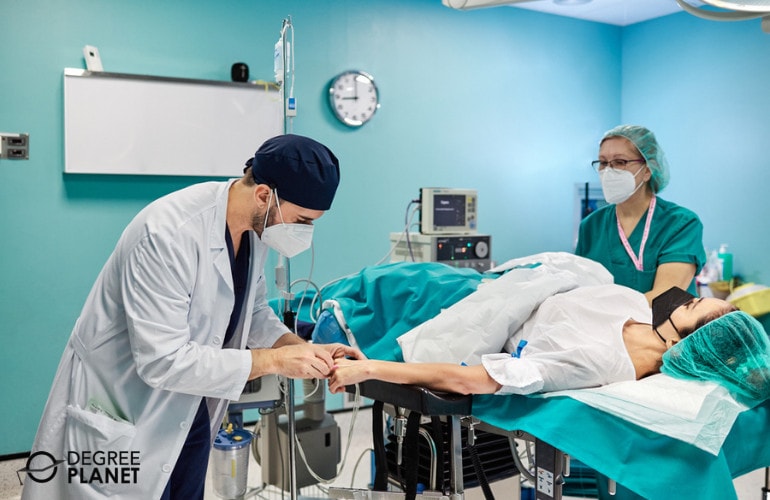
There’s a growing demand in the nursing field, and a Master of Science in Nursing (MSN) can help you qualify for licensure as a registered nurse as well as for certification in an advanced nursing specialty.
Editorial Listing ShortCode:
Depending on your specialization, a masters in nursing can also help you develop advanced leadership and administration skills applicable to the healthcare industry.
Direct-Entry MSN Programs Without GRE

Many students pursuing a Master of Science in Nursing (MSN) start with a Bachelor of Science in Nursing (BSN). But what if you have a bachelors in a non-nursing major and want to go for a career in the high-demand nursing profession?
Luckily, you don’t have to go back and get another bachelor’s degree to move ahead. Direct entry MSN programs allow non-nursing majors to earn a masters in nursing.
These types of programs are sometimes called direct admit nursing programs or masters entry nursing programs. They often take longer to complete than traditional MSN programs, but they take less time than it would take to earn a BSN and an MSN separately.
Editorial Listing ShortCode:
Direct entry MSN programs are designed to help you learn about foundational nursing topics and to prepare you for nursing specialties and RN licensure. In addition, a masters in nursing is a requirement for earning advanced practice registered nurse (APRN) certifications.
APRN specialties include:
- Nurse practitioner
- Nurse anesthetist
- Nurse midwife
- Clinical nurse specialist
The most common type of APRN is nurse practitioner (NP). There are many different NP specialties you can pursue as well. Since most programs help prepare you for licensing exams, they can also have field work requirements.
There are a number of direct entry MSN programs that do not require GRE scores for admissions. This can help speed up the enrollment process and allow you to start your nursing studies sooner.
Common Master’s in Nursing Specializations

Most direct entry master’s in nursing programs offer optional pathways for learning about more specialized areas of nursing practice. Some common specializations include:
- Nursing Healthcare Administration. This specialization is designed to help you develop skills and knowledge related to being an effective administrator in a range of healthcare settings.
- Family Nurse Practitioner. You can learn patient assessment skills, medical record keeping, health education, and preventative health strategies that are useful for nurse practitioners working in generalized family care settings.
- Adult-Gerontology Nurse Practitioner. You can learn specialized skills for working with older adults in general care or acute-care settings. You can also learn skills for working in community health settings, such as assisted living facilities, senior centers, or skilled nursing facilities.
- Pediatrics. This specialization can equip you to provide expert care to infants, children, and teens. You may learn about family health assessments, preventative care support, symptom diagnosis, and acute care interventions.
- Nursing Education. You can learn research and advocacy methods as well as training and teaching skills. Nurse educators may train other nurses or community health workers. They may also work with public health policy, community health outreach, and community health education.
These are only some of the specializations offered with online masters entry nursing programs.
Also, if you are interested in specializing in more than one area, dual programs offer the opportunity to train in two advanced practice registered nurse specialties at the same time. One example are the dual FNP and ACNP programs available at some universities.
You may want to see the kinds of pathways offered at different schools and consider what kind of learning fits your interests and goals.
Nursing Careers & Salaries
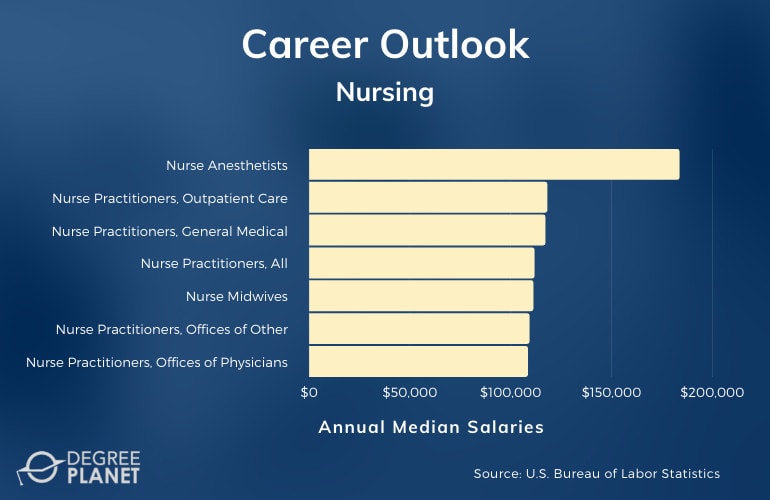
Demand for well-trained nurses and healthcare workers is soaring. Many factors can impact your career prospects, such as your area of professional specialization, your level of experience and licensing, and even where you live.
Depending on your education, experience, specialization, and certification, you can consider career opportunities in a range of roles and settings. According to the Bureau of Labor Statistics, nursing careers span a range of specializations, and many occupations in this field offer above average pay.
| Careers | Annual Median Salaries |
| Nurse Anesthetists | $183,580 |
| Nurse Practitioners, Outpatient Care Centers | $118,020 |
| Nurse Practitioners, General Medical and Surgical Hospitals | $117,080 |
| Nurse Practitioners, All | $111,680 |
| Nurse Midwives | $111,130 |
| Nurse Practitioners, Offices of Other Health Practitioners | $109,200 |
| Nurse Practitioners, Offices of Physicians | $108,430 |
| Medical and Health Services Managers | $104,280 |
| Registered Nurses, Hospitals | $76,840 |
| Registered Nurses, Nursing and Residential Care Facilities | $68,450 |
Some qualified nurses have specialized public health administration skills, while others may pursue training that equips them to work in the community health sector or in epidemiology.
Editorial Listing ShortCode:
With a public health specialization, nurses might work in schools, prisons, rehabilitation centers, public health offices, or community health nonprofits. There are also medical specializations to choose from, including midwifery, psychiatric nursing care, pediatric care, or geriatric care.
How to Choose an Online Entry Level Masters in Nursing Program

Trying to choose the right school may seem perplexing at first, but you can be well on your way to making a good choice once you know what options and advantages to look for.
Here’s a list of features to consider for making your own short list:
- Prerequisites. Some schools can help you earn prerequisites as quickly and economically as possible.
- Length of program. Even programs with a similar number of courses can differ in the time it takes to graduate. This is often due to a range of study and scheduling options. For instance, accelerated programs consist of full-time, year-round programming to help you earn your degree more quickly.
- Online vs. hybrid learning formats. Online learning can offer lots of flexibility. Since nursing programs involve hands-on tasks and training, you may also be interested in programs that offer in-person or hybrid learning options.
- Licensure support. You may want to consider which schools design their study formats to help students pass licensing exams and get licensed sooner. You can find out the student pass rate for licensing exams at the schools you’re considering and see how they compare as you make your list of top schools.
- Clinical practice. Depending on your career goals and areas of specialization, you may need to complete clinical or laboratory fieldwork. Requirements and formats can vary by school.
With this list in mind, you may able to more quickly decide which schools to apply to.
MSN Direct Entry Curriculum

Nursing courses will vary by school, but here are some of the courses you may encounter, depending on your specialty:
- Community Health Nursing: This course covers topics in public health practice, policy, and advocacy, including health education and community outreach, culturally-sensitive practice, and minority health policy and interventions.
- Systematic Health Assessment: You’ll learn skills and methods for systematic health assessments, including physical assessment skills, health history surveys, and assessments of medicines, disease, and individual and environmental risk factors.
- Pharmacology: This course gives an introduction to key concepts and principles related to the physiology of prescription drug use and related to managing drug prescriptions and drug interactions.
- Epidemiology: You’ll develop an understanding of disease transmission, the physiology of infection and disease transmission, transmission pathways, and statistical methods used in community health research.
- Healthcare Administration: You’ll learn about workplace administration, financial and resource management, and administrative practices applicable in hospitals, other direct-care facilities, and public health agencies.
- Care Management: This course teaches effective case management practices for family care and acute care settings as well as community health settings.
- Wellness and Disease Prevention: This course provides an overview of preventative health perspectives, policies, and practices. You’ll also learn about medical health screening, nutrition, physical fitness, hygiene, and risk mitigation.
- Healthcare Staffing and Supervision: You’ll learn about skills and practices for effective health care, human resource administration, and personnel training and supervision.
- Research Methods in Nursing Care: This course will familiarize you with practical research resources and methods you can apply to support effective nursing practice and interventions.
- Specialty Nursing: You’ll explore a specialized area of practice, such as pediatric nursing, acute care nursing, midwifery, or psychiatric care practices.
All in all, entry level MSN programs give you training in practical hands-on nursing skills as well as exposure to topics in medical science and health services administration.
Admissions Requirements

Admissions requirements for nursing vary by school and program, but for this high-demand field, you’ll find some programs offering less barriers to entry than others:
- GRE or GMAT scores (only some schools require them). There are MSN programs that waive GRE scores. In some cases, the GRE waiver may be linked to a qualifying GPA score or other qualification.
- Bachelor’s degree from an accredited school. You can enroll in a direct-entry MSN program without a bachelor’s degree in nursing.
- Satisfactory GPA. Minimum GPA requirements vary by school and program.
- Letters of recommendation. When required, schools request recommendations from academic or work supervisors who can attest to your character or work ethic.
If you want to qualify for licensure, it’s strategic to only apply to regionally accredited schools. It’s also beneficial to look for programs that fit your professional learning needs and interests.
Accreditation

When searching for a program with no GRE requirement for admissions, it’s beneficial to stick with fully accredited schools and programs. Regional accreditation ensures that you’re receiving a high quality education.
Editorial Listing ShortCode:
Regional school accreditation, and sometimes specified program accreditation, may be required by licensing boards and employers. Accreditation can also be a precondition for some forms of financial aid. The Council for Higher Education Accreditation (CHEA) has more information about accreditation and finding accredited schools.
Advanced Practice Registered Nurse Licensure and Certification

In addition to qualifying to be a registered nurse (RN), some professionals pursue supplementary advanced practice registered nurse (APRN) certifications in specialty areas such as:
- Clinical nurse specialist
- Certified nurse anesthetist
- Certified nurse midwife
- Certified nurse practitioner
- Emergency care nurse practitioner
There are many more specialty APRN certifications to choose from, especially for nurse practitioners. Earning advanced certification can qualify you to provide more advanced care and patient services, possibly opening doors to new career options and better pay. This makes being a nurse practitioner worth it for many nurses.
Financial Aid and Scholarships

A graduate degree can be a meaningful investment in your future, but you may need help covering upfront costs.
For many professionals, financial aid can help them keep moving forward. If you qualify, you may have the opportunity to pursue state or federal aid, employer-based programs, need-based or merit-based scholarships, or student loans.
The terms of financial aid can vary, so it’s beneficial to review any offers before proceeding. Filling out the Free Application for Federal Student Aid (FAFSA) can help you get started.
Is GRE Required for MSN?

While many Master of Science in Nursing programs require a Graduate Record Examination score, a growing number of accredited direct entry MSN schools are doing away with the requirement. Others are offering waivers to students who meet other qualifying conditions.
Picking an accredited school with no GRE requirement may help make admissions faster and easier. With the high-demand in nursing today, there are a number of accredited online and in-person no GRE direct entry nursing program options out there.
Can I Get an MSN without a BSN?

Yes, there are many accredited masters in nursing for non nurses programs that don’t require entering students to have a Bachelor of Science in Nursing (BSN).
If you don’t have a BSN, you may have some prerequisite courses to take before you can qualify for Master of Science in Nursing (MSN) programs at some schools. While a BSN is not required for direct entry MSN programs, an undergraduate degree in any discipline is still needed for admissions.
What Is Direct Entry MSN?
A direct entry Master of Science in Nursing (MSN) is an MSN program that accepts students who earned a bachelors degree in a non-nursing field.
In direct admit nursing programs, courses are designed to help you learn foundational skills and concepts, helping you prepare for licensing exams. You can also start studying an area of nursing practice specialization.
Editorial Listing ShortCode:
Some programs offer more foundational courses, and others may require some as admissions prerequisites. You may want to check requirements like these as you compare program offerings.
What Are the Advantages of a Direct-Entry MSN Program?

Direct-entry masters in nursing programs can offer some unique advantages to students who have a bachelors in a non-nursing major.
One advantage is that you can start working toward an MSN degree without going back to school to get a bachelor’s in nursing first. These programs are also efficient. You can quickly and more seamlessly take foundational nursing courses and then masters-level classes within the same program.
In other words, masters entry nursing programs can allow you to finish an MSN in less time than it takes to get a BSN and MSN separately.
What’s the Difference Between an Accelerated Nursing Program vs. Direct Entry MSN?
Direct-entry programs can help you earn a masters in less time than it would take to get a bachelors in nursing and a masters separately. If finishing even faster is important to you, accelerated programs can help you pick up the pace by offering accelerated study timelines.
| Direct Entry MSN | Accelerated Nursing Program |
|
|
Accelerated MSN programs for non nursing majors aren’t a good fit for everyone, but if you are able to study full-time, year-round, accelerated programs may interest you.
What’s the Difference Between a Nursing Bridge Program vs. Direct Entry MSN?
Many direct entry MSN students will be learning what they need to know for their first nursing jobs. Nursing bridge programs are designed to help experienced, full-time nurses earn a nursing degree while still working.
| Direct Entry MSN | Nursing Bridge Program |
|
|
Nursing bridge programs are often for licensed RNs who do not have a bachelors degree in nursing.
Is a Direct Entry MSN Worth It?

Yes, a direct entry MSN is worth it for many professionals. An MSN can help qualify you for RN or APRN licensure, depending on your specialization.
The Bureau of Labor Statistics projects 14% job growth for nurse anesthetists and 12% job growth for nurse midwives over the next ten years. Meanwhile, nurse practitioners are expected to experience 52% job growth, which is much faster than the average for all occupations.
Editorial Listing ShortCode:
Depending on your specialization, you could also acquire healthcare administration and management skills. According to the Bureau of Labor Statistics, jobs for medical and health services managers are anticipated to grow 32% over the next ten years.
Overall, the nursing field is growing rapidly. Even registered nurses are projected to experience positive growth, with an above average growth rate of 7%.
Universities Offering Direct Entry MSN Degree Programs
Methodology: The following school list is in alphabetical order. To be included, a college or university must be regionally accredited and offer degree programs online or in a hybrid format. In addition, the universities either do not require GRE test scores as part of the admission requirements or offer GRE waivers for qualified students.

Columbia University offers a Masters Direct Entry Program for those who are not nurses. To graduate, students must complete 75 credits and 1,000 clinical hours. Applicants must have a bachelor’s degree in a non-nursing field to be eligible. Applicants may also apply for a joint doctoral program.
Columbia is accredited by the Middle States Commission on Higher Education.
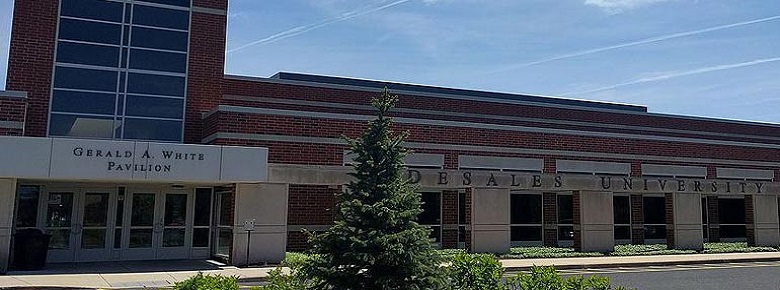
DeSales University offers a Bachelor of Science in Nursing program with direct entry into the Master of Science in Nursing program. The bachelor’s courses are held on campus, while the master’s courses are held online. Applicants must have a bachelor’s degree in a non-nursing field with a GPA of 3.0 or higher.
DeSales University is accredited by the Middle States Commission on Higher Education.

Regis College offers an Accelerated Direct Entry Master of Science in Nursing degree program. The program requires 94 credits and can typically be completed in 3 years.
This program gives students the opportunity to pursue a Bachelor’s and Master’s in Nursing. Those interested in the program must have an undergraduate degree with a GPA of 3.0 or higher. GRE requirements are waived for applicants with a master’s degree.
Regis College is accredited by the New England Commission of Higher Education.

Saint Louis University offers a Direct Entry Accelerated Master of Science in Nursing program.
The program can typically be completed in 21 months and includes 1,000 hours of clinical experience. Applicants must have an undergraduate degree with a minimum GPA of 3.2. Official transcripts, a resume, and a professional goal statement must be submitted when applying.
Saint Louis University is accredited by the Higher Learning Commission of the North Central Association of Colleges and Schools.

Trinity College of Nursing and Health Science offers a Direct Entry Program for students interested in a Master of Science in Nursing. To graduate, students must complete 74 credit hours, including a master’s thesis. Applicants must have a bachelor’s degree with a GPA of 3.2 or higher. A personal essay must be submitted with the application.
Trinity College of Nursing and Health Sciences is accredited by the Higher Learning Commission.

The University of Cincinnati offers an Accelerated Direct Entry Master of Science in Nursing program. Students must complete 64 credit hours to graduate. The program can typically be completed in 5 semesters. Those interested in the program must apply online with transcripts from a bachelor’s program, a resume, and a personal statement.
The University of Cincinnati is accredited by the Higher Learning Commission.

The University of New Hampshire offers a Direct Entry Master of Science in Nursing program. To graduate, students must complete 63 credit hours and 300 clinical hours. Applicants must submit official transcripts from any previously attended institutions, 3 letters of recommendation, and a personal essay.
The University of New Hampshire is accredited by the New England Commission of Higher Education.
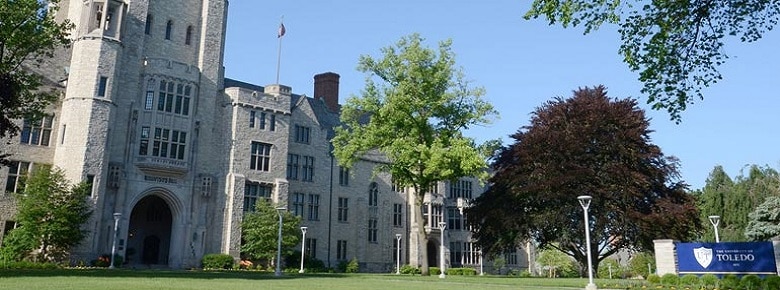
The University of Toledo offers a Master of Science in Nursing Graduate Entry program that allows students to pursue a doctorate. To graduate, students must complete 66 credit hours, 540 clinical hours, and 150 lab hours. Applicants must have a GPA higher than 3.0 from a bachelor’s degree in a different field.
The University of Toledo is accredited by the Higher Learning Commission.
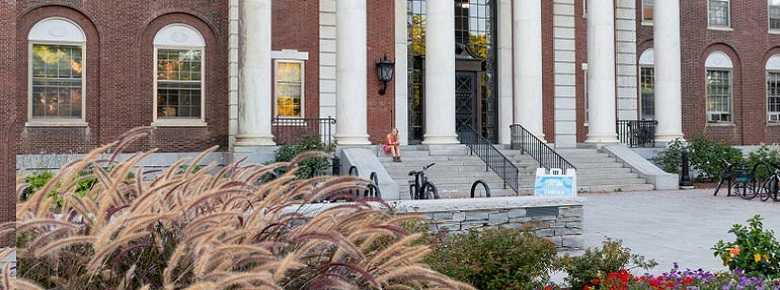
The University of Vermont offers a Direct Entry Doctor of Nursing Practice degree program.
The program allows students who do not have a bachelor’s degree in nursing to pursue higher education. Students may choose between the Adult-Gerontology Nursing Practitioner track and the Family Nurse Practitioner track. Applicants must have a GPA of 3.0 or higher with 3 letters of recommendation.
The University of Vermont is accredited by the New England Commission of Higher Education.

The University of Virginia offers a Direct Entry Clinical Nurse Leader program. After completing the program, students have direct entry to the Master of Nursing program. Those interested in the program must have a bachelor’s degree with a GPA of 3.0 or higher, 3 recommendations, a resume, and an interview with the school upon request.
The University of Virginia is accredited by the Southern Association of Colleges and Schools Commission on Colleges.
Earning Your Direct Entry MSN Degree

If you want a career in the nursing field but have a non-nursing bachelor’s degree, you might be a good candidate for a direct entry MSN degree.
For a quick or easy enrollment process, you might want to consider a no GRE direct entry nursing program from an accredited university. There are also convenient online and hybrid learning options available.
Also, if you would like to pair a nursing masters degree with a masters from another field, a growing number of universities offer combined masters programs online. Likewise, if you already hold an RN license, you may want to look into the universities offering a fast track RN-to-BSN online program.
If you’re ready to earn a direct entry MSN for non nurses, why not start looking today for the program option that’s right for you?

